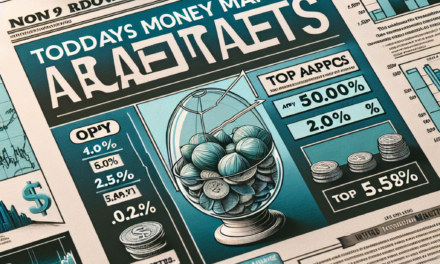“Buffett’s Apple Sale: A $97B Cash Surge Sparks Strategic Speculation at Berkshire Hathaway”
Introduction
Warren Buffett’s strategic financial maneuvers have once again captured the attention of investors and analysts alike, as Berkshire Hathaway’s recent sale of a portion of its Apple stake has resulted in a substantial $97 billion cash influx. This move has sparked widespread speculation and analysis regarding the conglomerate’s cash management strategy, with experts weighing in on the potential implications for future investments and acquisitions. The decision to trim its holdings in one of the world’s most valuable companies underscores Buffett’s disciplined approach to portfolio management and capital allocation, prompting a closer examination of Berkshire’s broader financial strategy in an ever-evolving market landscape.
Warren Buffett’s Strategic Shift: Analyzing the Apple Stake Sale
Warren Buffett, the legendary investor and CEO of Berkshire Hathaway, has long been known for his strategic acumen and ability to navigate the complexities of the financial markets. Recently, Buffett made headlines with the sale of a portion of Berkshire Hathaway’s stake in Apple, a move that has significantly bolstered the conglomerate’s cash reserves by an impressive $97 billion. This decision has sparked considerable interest and debate among analysts and investors, who are keen to understand the implications of this strategic shift and what it might signal about Berkshire’s future direction.
To begin with, it is essential to recognize the significance of Apple within Berkshire Hathaway’s portfolio. Apple has been one of Buffett’s most successful investments, contributing substantially to the company’s overall performance. The decision to sell a portion of this stake, therefore, is not one to be taken lightly. Analysts suggest that this move could be indicative of Buffett’s cautious approach in the face of current market uncertainties. With global economic conditions remaining volatile, maintaining a robust cash position provides Berkshire with the flexibility to capitalize on potential opportunities or weather unforeseen challenges.
Moreover, the sale of Apple shares aligns with Buffett’s long-standing investment philosophy, which emphasizes value investing and prudent financial management. By increasing Berkshire’s cash reserves, Buffett is effectively positioning the company to take advantage of market dislocations or distressed assets that may arise in the future. This strategy is consistent with his historical approach of deploying capital when others are hesitant, thereby securing favorable deals and generating substantial returns for shareholders.
In addition to reinforcing Berkshire’s financial stability, the cash boost from the Apple stake sale also raises questions about potential acquisition targets. Buffett has often expressed his preference for acquiring high-quality businesses with strong management teams and sustainable competitive advantages. With a significant cash war chest at his disposal, it is plausible that Berkshire may be on the lookout for such opportunities. Analysts speculate that sectors like technology, healthcare, and energy could be of particular interest, given their growth potential and strategic importance in the evolving economic landscape.
Furthermore, the decision to sell Apple shares may also reflect Buffett’s assessment of the tech giant’s valuation. While Apple remains a dominant player in the technology sector, its stock has experienced substantial appreciation over the years. By trimming Berkshire’s position, Buffett could be signaling a belief that the stock’s current valuation may not offer the same margin of safety as it once did. This move underscores the importance of disciplined investing and the need to reassess portfolio holdings in light of changing market dynamics.
As analysts weigh in on Berkshire’s cash strategy, it is clear that Buffett’s decision to sell a portion of the Apple stake is a multifaceted one, driven by a combination of market conditions, valuation considerations, and strategic foresight. While the move has undoubtedly strengthened Berkshire’s financial position, it also highlights the challenges and opportunities that lie ahead. Investors will be closely monitoring how Buffett and his team deploy this capital, as their actions will provide valuable insights into the company’s future trajectory.
In conclusion, Warren Buffett’s sale of a portion of Berkshire Hathaway’s Apple stake represents a significant strategic shift that has bolstered the company’s cash reserves by $97 billion. This move, while reflective of Buffett’s cautious approach in uncertain times, also opens the door to potential acquisitions and investment opportunities. As analysts continue to assess the implications of this decision, it is evident that Buffett’s strategic foresight and disciplined investment philosophy remain at the core of Berkshire Hathaway’s success.
Berkshire Hathaway’s Cash Reserves: Implications of a $97B Boost
Warren Buffett’s recent decision to sell a portion of Berkshire Hathaway’s stake in Apple has resulted in a significant boost to the conglomerate’s cash reserves, now totaling an impressive $97 billion. This strategic move has sparked considerable interest and speculation among analysts and investors alike, as they attempt to decipher the implications of such a substantial cash accumulation. The sale of Apple shares, a cornerstone investment for Berkshire Hathaway, marks a noteworthy shift in the company’s portfolio management strategy. Historically, Buffett has been known for his long-term investment approach, often holding onto stocks for decades. However, the decision to reduce Berkshire’s position in Apple suggests a more dynamic strategy, possibly aimed at capitalizing on the tech giant’s high valuation and reallocating resources to other opportunities.
The infusion of cash into Berkshire’s reserves raises questions about the company’s future investment plans. With $97 billion at its disposal, Berkshire Hathaway is well-positioned to pursue a variety of strategic options. Analysts speculate that this cash reserve could be used for several purposes, including acquisitions, stock buybacks, or even further diversification of its investment portfolio. The potential for acquisitions is particularly intriguing, as Buffett has historically favored purchasing entire companies or significant stakes in businesses that align with Berkshire’s long-term vision. The current economic climate, characterized by market volatility and uncertainty, may present unique opportunities for Berkshire to acquire undervalued assets or companies in sectors poised for growth.
Moreover, the substantial cash reserve provides Berkshire with a buffer against economic downturns, allowing the company to weather potential financial storms without compromising its operational stability. This conservative approach to cash management is consistent with Buffett’s investment philosophy, which emphasizes financial prudence and risk mitigation. However, holding such a large amount of cash also presents challenges, particularly in an environment of low interest rates. The opportunity cost of holding cash is significant, as it generates minimal returns compared to potential gains from investments in equities or other asset classes. Consequently, analysts are keenly observing how Berkshire will deploy its cash reserves to maximize shareholder value.
In addition to acquisitions, stock buybacks are another potential avenue for utilizing the cash reserves. By repurchasing its own shares, Berkshire could enhance shareholder value by reducing the number of outstanding shares, thereby increasing earnings per share. This strategy has been employed by the company in the past, and with the current cash surplus, it remains a viable option. Furthermore, the decision to sell Apple shares and bolster cash reserves may also reflect Buffett’s cautious outlook on the broader market. With concerns about inflation, interest rate hikes, and geopolitical tensions, maintaining a robust cash position could be a strategic move to safeguard against potential market corrections.
In conclusion, Warren Buffett’s sale of Apple shares and the resulting $97 billion cash boost for Berkshire Hathaway have significant implications for the company’s future strategy. While the increased cash reserves provide flexibility and security, they also present challenges in terms of opportunity cost and investment decisions. As analysts weigh in on Berkshire’s cash strategy, the focus remains on how the conglomerate will leverage its financial strength to navigate the evolving economic landscape and continue delivering value to its shareholders. The coming months will be crucial in determining the direction Berkshire Hathaway will take, as it balances the need for prudent financial management with the pursuit of growth opportunities.
The Role of Apple in Warren Buffett’s Investment Portfolio
Warren Buffett, the legendary investor and chairman of Berkshire Hathaway, has long been known for his strategic investment decisions and his ability to navigate the complexities of the financial markets. One of the most significant components of his investment portfolio in recent years has been Apple Inc., a company that has consistently delivered substantial returns. However, recent reports indicate that Buffett has begun to sell a portion of his Apple stake, resulting in a $97 billion cash boost for Berkshire Hathaway. This move has sparked considerable interest and debate among analysts, who are keen to understand the implications of this decision on Berkshire’s overall cash strategy.
Apple has played a pivotal role in Warren Buffett’s investment portfolio, representing a significant portion of Berkshire Hathaway’s equity holdings. The tech giant’s consistent performance and robust financial health have made it an attractive investment for Buffett, who has traditionally favored companies with strong fundamentals and a clear competitive advantage. Over the years, Apple’s stock has appreciated significantly, contributing to the growth of Berkshire’s portfolio and reinforcing Buffett’s reputation as a shrewd investor. However, the recent sale of a portion of this stake suggests a potential shift in strategy, prompting analysts to examine the underlying reasons and potential outcomes.
One possible explanation for the sale is the need to maintain a balanced and diversified portfolio. As Apple continued to grow, it naturally occupied a larger share of Berkshire’s holdings, potentially skewing the balance that Buffett typically seeks to maintain. By selling a portion of the Apple stake, Buffett may be aiming to realign the portfolio, ensuring that it remains diversified and not overly reliant on a single company, regardless of its past performance. This approach aligns with Buffett’s long-standing investment philosophy, which emphasizes the importance of diversification to mitigate risk.
Moreover, the sale has resulted in a substantial increase in Berkshire’s cash reserves, now totaling $97 billion. This cash boost provides Buffett with significant flexibility to explore new investment opportunities or to bolster existing positions in other companies. Analysts speculate that this move could be a strategic preparation for potential market downturns or economic uncertainties, allowing Berkshire to capitalize on opportunities that may arise during periods of volatility. The increased cash reserves also offer the potential for share buybacks, which could enhance shareholder value by reducing the number of outstanding shares and increasing earnings per share.
Furthermore, the decision to sell a portion of the Apple stake may reflect Buffett’s assessment of the current market environment. With valuations in the tech sector reaching unprecedented levels, Buffett may have deemed it prudent to lock in gains and reduce exposure to potential market corrections. This cautious approach is consistent with his reputation for being a value investor who prioritizes long-term stability over short-term gains.
In conclusion, Warren Buffett’s decision to sell a portion of his Apple stake and boost Berkshire Hathaway’s cash reserves has sparked considerable interest and analysis. While the move may initially appear surprising given Apple’s historical performance, it aligns with Buffett’s investment principles of diversification, risk management, and strategic flexibility. As analysts continue to weigh in on the implications of this decision, it remains clear that Buffett’s approach to investing is as calculated and forward-thinking as ever, ensuring that Berkshire Hathaway remains well-positioned to navigate the ever-evolving financial landscape.
Analysts’ Perspectives on Berkshire’s Cash Management Strategy
Warren Buffett’s recent decision to sell a portion of Berkshire Hathaway’s stake in Apple has sparked considerable discussion among financial analysts, particularly regarding the implications for Berkshire’s cash management strategy. The sale, which contributed to a significant $97 billion cash boost for the conglomerate, has been interpreted in various ways by market observers. While some view it as a strategic move to capitalize on Apple’s high valuation, others see it as a reflection of Buffett’s cautious approach in an uncertain economic environment. This development has prompted analysts to delve deeper into Berkshire’s broader cash management strategy, examining how the company balances liquidity with investment opportunities.
To begin with, the sale of Apple shares aligns with Buffett’s long-standing investment philosophy of buying undervalued stocks and selling them when they reach or exceed their intrinsic value. Apple, having seen a substantial increase in its stock price over recent years, presented an opportune moment for Berkshire to realize gains. This move is consistent with Buffett’s pragmatic approach to investing, where he emphasizes the importance of not becoming overly attached to any single investment, regardless of its past performance. By reducing its stake in Apple, Berkshire not only locks in profits but also diversifies its portfolio, mitigating potential risks associated with holding a concentrated position in one company.
Moreover, the substantial cash reserve that Berkshire now holds provides the company with significant flexibility. Analysts suggest that this liquidity could be strategically advantageous, especially in a market characterized by volatility and uncertainty. With a robust cash position, Berkshire is well-positioned to seize opportunities that may arise during market downturns, such as acquiring undervalued companies or assets at attractive prices. This aligns with Buffett’s historical pattern of making bold acquisitions during times of economic distress, thereby enhancing Berkshire’s long-term growth prospects.
However, the accumulation of such a large cash reserve has also raised questions about Berkshire’s current investment strategy. Some analysts argue that holding excessive cash could indicate a lack of attractive investment opportunities in the market, which might suggest a more cautious outlook on the part of Buffett and his team. In an environment where interest rates remain relatively low, the opportunity cost of holding cash is significant, as it could otherwise be deployed in higher-yielding investments. This has led to speculation about whether Berkshire might be preparing for a major acquisition or if it is simply adopting a more conservative stance in anticipation of potential economic challenges.
Furthermore, the decision to sell Apple shares and bolster cash reserves may also reflect broader macroeconomic considerations. With ongoing geopolitical tensions, inflationary pressures, and concerns about a potential economic slowdown, maintaining a strong cash position could be a prudent strategy to navigate these uncertainties. Analysts note that Buffett’s cautious approach is not without precedent; he has often emphasized the importance of financial resilience and the ability to act decisively when opportunities arise.
In conclusion, Warren Buffett’s sale of Apple shares and the resulting $97 billion cash boost have sparked a lively debate among analysts regarding Berkshire Hathaway’s cash management strategy. While the move underscores Buffett’s disciplined investment approach and provides the company with strategic flexibility, it also raises questions about the current investment landscape and Berkshire’s future plans. As the economic environment continues to evolve, observers will be keenly watching how Buffett and his team deploy this substantial cash reserve, balancing the need for liquidity with the pursuit of long-term value creation.
The Impact of Warren Buffett’s Decisions on the Stock Market
Warren Buffett, the legendary investor and chairman of Berkshire Hathaway, has long been a figure whose investment decisions are closely scrutinized by market participants. Recently, his decision to sell a portion of Berkshire Hathaway’s stake in Apple has sparked significant interest and debate among analysts and investors alike. This move, which contributed to a substantial $97 billion cash reserve for Berkshire, has prompted discussions about the implications of such a strategy on both the company and the broader stock market.
To understand the impact of Buffett’s decision, it is essential to consider the context in which it was made. Apple, a cornerstone of Berkshire’s portfolio, has been a highly successful investment for the conglomerate, contributing significantly to its overall performance. However, the partial divestment suggests a strategic shift that may be driven by a variety of factors, including valuation concerns, diversification needs, or a desire to capitalize on Apple’s impressive stock performance. By selling a portion of its Apple holdings, Berkshire has not only realized substantial gains but also increased its liquidity, providing the company with greater flexibility to pursue new opportunities.
The accumulation of a $97 billion cash reserve is a testament to Berkshire’s cautious approach in an uncertain economic environment. Analysts have noted that this substantial cash position could be indicative of Buffett’s anticipation of potential market volatility or economic downturns. By maintaining a robust cash reserve, Berkshire is well-positioned to capitalize on attractive investment opportunities that may arise during periods of market dislocation. This strategy aligns with Buffett’s long-standing investment philosophy of being “fearful when others are greedy and greedy when others are fearful.”
Moreover, the decision to bolster cash reserves may also reflect a broader trend among large institutional investors who are increasingly prioritizing liquidity and risk management. In an era marked by geopolitical tensions, inflationary pressures, and evolving monetary policies, maintaining a strong cash position can serve as a buffer against unforeseen challenges. Consequently, Buffett’s move could be seen as a prudent measure to safeguard Berkshire’s financial stability while remaining agile in a rapidly changing market landscape.
The ripple effects of Buffett’s decision extend beyond Berkshire Hathaway, influencing investor sentiment and market dynamics. As one of the most influential figures in the investment world, Buffett’s actions often serve as a bellwether for market trends. The sale of Apple shares, coupled with the accumulation of cash, may signal to other investors that it is time to reassess their own portfolios and consider the potential risks and rewards of their current holdings. This could lead to increased market volatility as investors adjust their strategies in response to perceived shifts in market conditions.
In conclusion, Warren Buffett’s decision to sell a portion of Berkshire Hathaway’s Apple stake and amass a $97 billion cash reserve has significant implications for both the company and the broader stock market. By enhancing liquidity and maintaining a cautious approach, Berkshire is well-prepared to navigate potential economic challenges and seize future investment opportunities. As analysts continue to weigh in on the rationale behind this strategy, it is clear that Buffett’s actions will remain a focal point for investors seeking to understand the evolving dynamics of the financial markets.
Future Investment Opportunities for Berkshire Hathaway’s Cash Pile
Warren Buffett’s recent decision to sell a portion of Berkshire Hathaway’s stake in Apple has resulted in a significant cash influx, boosting the conglomerate’s reserves by an impressive $97 billion. This strategic move has sparked considerable interest and speculation among analysts regarding the future investment opportunities that Berkshire Hathaway might pursue with its burgeoning cash pile. As the company navigates an ever-evolving economic landscape, the potential avenues for deploying this capital are both diverse and complex.
To begin with, the sale of Apple shares, while noteworthy, is not entirely surprising given Buffett’s historical approach to portfolio management. Known for his value investing philosophy, Buffett has often emphasized the importance of maintaining a robust cash reserve to capitalize on market opportunities as they arise. This latest maneuver aligns with his long-standing strategy of ensuring liquidity to seize attractive investments during periods of market volatility or economic downturns. Consequently, analysts are keenly observing how Berkshire Hathaway might leverage this substantial cash reserve to enhance its portfolio and drive future growth.
One potential area of interest for Berkshire Hathaway is the technology sector, which continues to demonstrate robust growth and innovation. Despite the partial divestment from Apple, the tech industry remains a fertile ground for investment, offering opportunities in emerging fields such as artificial intelligence, cloud computing, and cybersecurity. By strategically investing in these areas, Berkshire could position itself at the forefront of technological advancements, thereby securing long-term value for its shareholders.
In addition to technology, the renewable energy sector presents another compelling opportunity for Berkshire Hathaway. With global efforts to combat climate change gaining momentum, investments in clean energy sources such as solar, wind, and hydroelectric power are becoming increasingly attractive. Berkshire’s existing investments in utilities and energy companies provide a solid foundation for further expansion into this sector. By channeling its cash reserves into renewable energy projects, the conglomerate could not only contribute to environmental sustainability but also tap into a growing market with significant potential for returns.
Moreover, the healthcare industry offers promising prospects for Berkshire Hathaway’s investment strategy. The ongoing advancements in medical technology, coupled with an aging global population, are driving demand for innovative healthcare solutions. By investing in companies that are at the forefront of medical research and development, Berkshire could capitalize on the sector’s growth trajectory while addressing critical societal needs. This approach would align with Buffett’s preference for investing in businesses with strong fundamentals and long-term growth potential.
Furthermore, Berkshire Hathaway’s cash pile could be utilized to pursue strategic acquisitions across various industries. Historically, the conglomerate has demonstrated a keen ability to identify undervalued companies with strong management teams and sustainable business models. By acquiring such businesses, Berkshire can enhance its portfolio diversification and generate additional revenue streams. This strategy not only mitigates risk but also positions the company to benefit from synergies and operational efficiencies.
In conclusion, Warren Buffett’s decision to sell a portion of Berkshire Hathaway’s Apple stake has significantly bolstered the company’s cash reserves, providing a wealth of opportunities for future investments. As analysts weigh in on the potential strategies, it is evident that the technology, renewable energy, and healthcare sectors offer promising avenues for growth. Additionally, strategic acquisitions could further enhance Berkshire’s portfolio and drive long-term value creation. Ultimately, the deployment of this substantial cash pile will be guided by Buffett’s prudent investment philosophy, ensuring that Berkshire Hathaway remains well-positioned to capitalize on emerging opportunities in an ever-changing economic landscape.
Lessons from Warren Buffett’s Approach to Cash and Investments
Warren Buffett, the legendary investor and chairman of Berkshire Hathaway, has long been a subject of fascination for both seasoned investors and financial novices alike. His recent decision to sell a portion of Berkshire’s stake in Apple, a move that has contributed to a staggering $97 billion cash reserve, has once again put the spotlight on his investment strategies. This decision has sparked a flurry of analysis and speculation among financial experts, who are keen to understand the rationale behind such a significant cash accumulation and what it might signal for the future of Berkshire Hathaway.
To comprehend the implications of Buffett’s actions, it is essential to delve into his overarching investment philosophy. Buffett has always emphasized the importance of value investing, a strategy that involves identifying undervalued companies with strong fundamentals and holding onto them for the long term. His approach is characterized by patience, discipline, and a keen eye for intrinsic value. The sale of Apple shares, therefore, might seem counterintuitive at first glance, given Apple’s robust performance and its status as a cornerstone of Berkshire’s portfolio. However, it is crucial to recognize that Buffett’s decisions are often driven by a broader strategic vision rather than short-term market fluctuations.
One possible explanation for the sale is Buffett’s well-documented aversion to holding excessive amounts of cash without a clear investment opportunity. While cash provides flexibility and security, it also represents an opportunity cost, as it could be deployed in more productive assets. By trimming Berkshire’s Apple holdings, Buffett may be positioning the company to capitalize on future investment opportunities that align with his value-oriented approach. This move underscores his belief in maintaining a balance between liquidity and investment potential, ensuring that Berkshire is well-prepared to seize opportunities as they arise.
Moreover, Buffett’s decision can be seen as a reflection of his cautious outlook on the current market environment. With global economic uncertainties and fluctuating market conditions, holding a substantial cash reserve offers a buffer against potential downturns. This conservative stance is consistent with Buffett’s historical preference for financial prudence, particularly during times of economic volatility. By bolstering Berkshire’s cash reserves, he is effectively safeguarding the company’s financial health while retaining the flexibility to act decisively when attractive investment prospects emerge.
In addition to these strategic considerations, Buffett’s actions also provide valuable lessons for individual investors. His disciplined approach to cash management highlights the importance of maintaining a long-term perspective and resisting the temptation to chase short-term gains. By prioritizing value and exercising patience, investors can navigate market uncertainties with greater confidence and resilience. Furthermore, Buffett’s emphasis on liquidity serves as a reminder of the importance of having a financial cushion to weather unexpected challenges and capitalize on opportunities.
In conclusion, Warren Buffett’s recent sale of Apple shares and the resulting $97 billion cash reserve offer a compelling insight into his investment philosophy and strategic foresight. While the decision may initially appear surprising, it aligns with his principles of value investing, financial prudence, and long-term planning. As analysts continue to weigh in on Berkshire’s cash strategy, one thing remains clear: Buffett’s approach to cash and investments provides timeless lessons for investors seeking to build wealth with wisdom and foresight.
Q&A
1. **What prompted Warren Buffett to sell a portion of his Apple stake?**
Analysts suggest that the sale was part of a broader strategy to manage portfolio risk and capitalize on Apple’s high valuation.
2. **How much did Berkshire Hathaway’s cash reserves increase due to the Apple stake sale?**
The sale contributed to a $97 billion boost in Berkshire Hathaway’s cash reserves.
3. **What is the significance of the $97 billion cash reserve for Berkshire Hathaway?**
The substantial cash reserve provides Berkshire with flexibility for future investments, acquisitions, or stock buybacks.
4. **How do analysts view Berkshire’s cash strategy following the Apple stake sale?**
Analysts believe that maintaining a large cash reserve allows Berkshire to be opportunistic in volatile markets and take advantage of potential investment opportunities.
5. **What impact did the sale have on Berkshire Hathaway’s overall investment portfolio?**
The sale slightly reduced Berkshire’s exposure to Apple but maintained it as a significant part of the portfolio, reflecting continued confidence in the company.
6. **How does Warren Buffett typically approach large cash reserves?**
Buffett is known for his cautious approach, preferring to hold substantial cash reserves to ensure liquidity and readiness for attractive investment opportunities.
7. **What are potential future moves for Berkshire Hathaway with its increased cash reserves?**
Potential moves include pursuing large acquisitions, increasing stock buybacks, or investing in undervalued stocks, depending on market conditions and opportunities.
Conclusion
Warren Buffett’s decision to sell a portion of Berkshire Hathaway’s stake in Apple has significantly contributed to a $97 billion increase in the company’s cash reserves. Analysts suggest that this move aligns with Berkshire’s broader cash strategy, which emphasizes maintaining substantial liquidity to capitalize on future investment opportunities and navigate economic uncertainties. The sale reflects Buffett’s disciplined approach to portfolio management, balancing the need for cash reserves with the potential for long-term growth. This strategy allows Berkshire to remain agile and responsive to market conditions, ensuring the company is well-positioned for strategic acquisitions or investments that align with its value-driven philosophy.





